Related Research Articles

Addis Ababa University (AAU) is a national university located in Addis Ababa, Ethiopia. It is the oldest university in Ethiopia. AAU has thirteen campuses. Twelve of these are situated in Addis Ababa, and one is located in Bishoftu, about 45 kilometres (28 mi) away. AAU has several associated research institutions including the Institute of Ethiopian Studies. The Ministry of Education admits qualified students to AAU based on their score on the Ethiopian University Entrance Examination (EUEE).
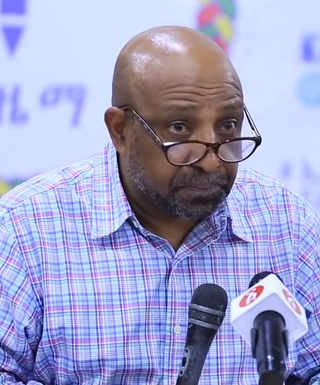
Berhanu Nega is an Ethiopian politician who is serving as the current Minister of Education of Ethiopia. He previously was the mayor elect of Addis Ababa, Ethiopia, in the 2005 Ethiopian general elections. He is a founding chairman of the Rainbow Ethiopia: Movement for Democracy and Social Justice and a Deputy Chairman of Coalition for Unity and Democracy (CUD), for whom he served as chief election campaign strategist. He is also the co-founder and leader of Ginbot 7, an anti-government rebel group. Until mid-2018, he was labelled a terrorist by the Ethiopian government.

Haddis Alemayehu was an Ethiopian novelist and Foreign Minister of Ethiopia. His Amharic novel Love to the Grave is considered a classic of modern Ethiopian literature.
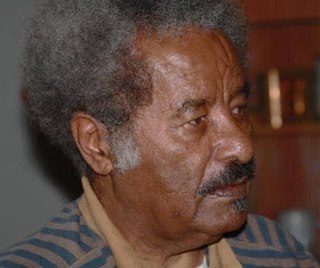
Mesfin Woldemariam was an Ethiopian academic and human rights activist.

Canada and Ethiopia established diplomatic relations in 1956. Canada opened an embassy in Addis Ababa in 1957; although Ethiopia opened an embassy in Ottawa in 1962, it was closed the next year due to financial constraints and not re-opened until 1989. In 2021, Ethiopia closed its embassy in Ottawa again due to reshuffling and reorganization. In 2022, Ethiopia reopened its embassy in Ottawa.
The Baháʼí Faith in Ethiopia began after ʻAbdu'l-Bahá wrote letters encouraging taking the religion to Africa in 1916. Probably the first Baháʼí to settle in the country came in early 1934 and with further pioneers by mid-1934, the first Baháʼí Local Spiritual Assembly of the country was elected in November in Addis Ababa. In 1962, Ethiopia Baháʼís had elected a National Spiritual Assembly. By 1963 there were seven localities with smaller groups of Baháʼís in the country. The Association of Religion Data Archives estimated some 27000 Baháʼís in 2005. The community celebrated its diamond jubilee in January 2009.

Dawit Kebede is an Ethiopian journalist who spent 21 months as a political prisoner after criticising his country's government in the lead up to the 2005 general election. He was released on a presidential pardon nearly two years later and sought asylum in the United States in 2011. He returned to Ethiopia in 2014. Dawit was awarded the 2010 CPJ International Press Freedom Award for his dedication to journalism.

Sinknesh Ejigu Wolde-Mariam is an Ethiopian politician, chemist, businesswoman and diplomat.
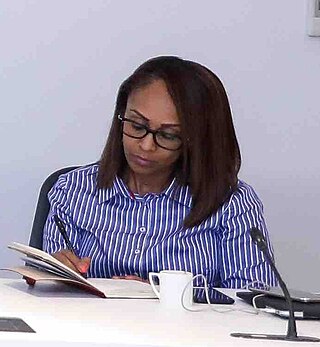
Billene Seyoum Woldeyes is an Ethiopian politician, poet and author who is serving as the Foreign Press Secretary for the Office of Prime Minister of Ethiopia since 5 November 2018. Billene speaks as the prime minister's foreign spokesperson in English.
Dagmawit Moges Bekele is an Ethiopian politician who was Minister of Transport and Communications of Ethiopia from October 2018 to 14 January 2023. Dagmawit became Deputy Mayor of Addis Ababa in July 2018. She began working as AU's Peace Fund Secretariat since March 2023.

Adanech Abebe is an Ethiopian politician who is serving as the thirty-second mayor of Addis Ababa since 2021. She has been serving as a deputy mayor from 2020 until 2021. She previously was the Minister of Revenue and Customs Authority from 2018 to 2020, when she became the first female to assume the role of the Federal Attorney General of Ethiopia. She is the first woman to hold the mayorship since it was created in 1910.
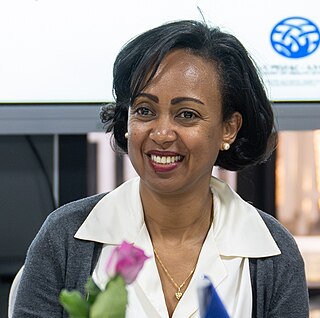
Lia Tadesse Gebremedhin is an Ethiopian politician and physician who served as the Minister of Health from 12 March 2020 until 8 February 2024. Prior to her appointment, Lia served as State Minister of Health from November 2018. She also served as an Executive Director at the University of Michigan's Center for International Reproductive Health Training (CIRHT) in Ann Arbor, Michigan, as a CEO and Vice Provost in St. Paul's Hospital Millennium Medical College (SPHMMC) in Addis Ababa and as a Project Director of USAID's Maternal and Child Survival Program (MCSP) at Jhpiego-Ethiopia.
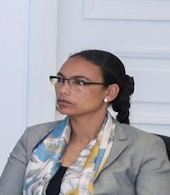
Hirut Kassaw is an Ethiopian politician who has served as Ministry of Culture and Tourism of Ethiopia from October 2018 until 6 October 2021. Before being Minister, Hirut served as assistant professor at Bahir Dar University. The ministry that she leads has received an award from the Pacific Travel Writers Association (PATWA). She also won the "Best Tourism Minister" award.

Ergoge Tesfaye is an Ethiopian politician who is currently serving as the Minister of Women, Children and Youth since 6 October 2021. She is also the one who served as a Minister for the Minister of Labour and Skills Development from 2018 to 2021.

The Council of Ministers of Abiy Ahmed is the cabinet of the government of Ethiopia during the premiership of Abiy Ahmed since early 2018.

The Ministry of Science and Higher Education was the Ethiopian government department established in 2018 which has a responsibility to lead the development of science, higher education, and the technical and vocational education and training (TVET) in the country. It established by proclamation number 1097/2018 in October 2018. Hirut Woldemariam is the prior by leading the ministry since its foundation to August 2020. Samuel Urkato was the Minister of Science and Higher Education from August 2020 to October 2021, when it was merged into the Ministry of Education.
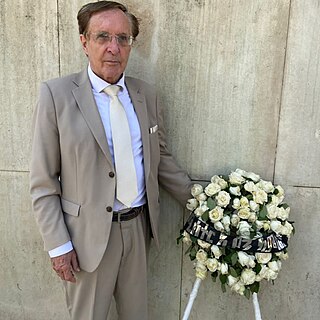
Ian Leslie Campbell is a British historian specialising in Ethiopia with a focus on the Italian occupation of Ethiopia. During his career, he worked together with Ethiopianist Richard Pankhurst.
Duri Mohammed was an Ethiopian government official. He served as Permanent Representative to the United Nations and was Vice President of the United Nations General Assembly in the 1990s. Duri is also known for co-founding the Harari National League.

Higher education in Ethiopia has been improving in quality, standard, relevance, and academic freedom. Despite an expansion of private higher education and rising enrollment, the quality of education they render is still under question. Higher education supposed originated by Saint Yared music school in the sixth century in line with centuries old traditional education of the Ethiopian Orthodox Tewahedo Church. Modern higher education was commenced during the reign of Emperor Haile Selassie with the establishment of the University College of Addis Ababa, now called Addis Ababa University, in 1950. It then followed by Haramaya University and Ambo school of agriculture, today's Ambo University. By this time, there were only three secondary schools in the country, used as preparatory for college entrance.
Yalemtsehay Mekonnen is an Ethiopian physiologist and pharmacologist who specializes in the use and safety of medicinal plants. In 2009, she became the first woman in Ethiopia to become a full professor. She is Professor of Cell & Human Physiology at Addis Ababa University (AAU).
References
- 1 2 3 "H.E. Prof. Hirut Woldemariam". diasporaforum2019.com. Retrieved 8 December 2020.
- 1 2 3 "H.E. Prof. Hirut Woldemariam | icipe - International Centre of Insect Physiology and Ecology". www.icipe.org. Retrieved 8 December 2020.
- ↑ Team, AWiB (30 November 2020). "Professor Hirut Woldemariam: Fearless Woman Still on The Rise". AWiB. Retrieved 30 December 2020.
- 1 2 "Publications by Hirut Woldemariam | College of Humanities, Language studies, Journalism & Communication". www.aau.edu.et. Retrieved 8 December 2020.
- 1 2 3 "Hirut Woldemariam | College of Humanities, Language studies, Journalism & Communication". www.aau.edu.et. Retrieved 8 December 2020.
- ↑ Addisstandard (18 August 2020). "News update: New appointments see defense minister, Addis Abeba deputy mayor removed". Addis Standard. Retrieved 8 December 2020.